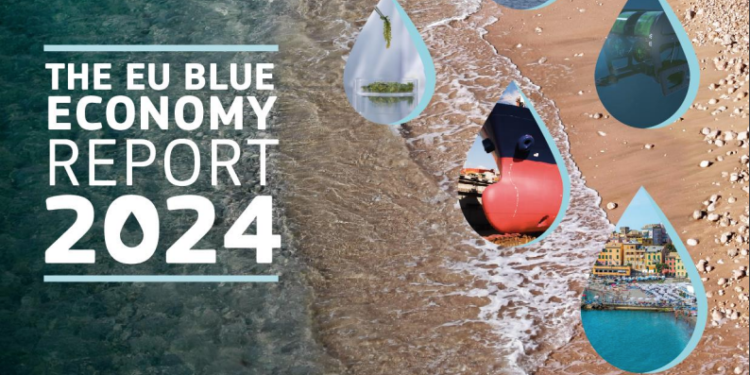The new edition of the Blue Economy Report has been recently published, providing a detailed analysis of the sectors that make up Europe’s blue economy and their performance based on the latest available data. The blue economy, which includes all economic activities related to oceans, seas, and coasts, plays a crucial role in sustainable economic development.
The report covers a wide range of sectors, including fishing, aquaculture, coastal tourism, maritime transport, ports, and marine renewable energy. These sectors are fundamental to the EU economy, contributing not only to economic growth but also to environmental sustainability and food security.
The latest data from Eurostat, referring to 2021, shows a strong performance of the EU’s blue economy:
Employment: 3.6 million people employed (+17% compared to 2020)
Revenue: Almost 624 billion euros (+21% compared to 2020)
Gross Value Added (GVA): 171 billion euros (+35% compared to 2020)
Despite the difficulties related to the Covid-19 pandemic and the rise in energy prices caused by Russia’s invasion of Ukraine, most sectors of the blue economy have seen significant improvements. However, coastal tourism has not fully recovered from the pandemic restrictions.
Several sectors have shown remarkable growth between 2015 and 2021:
Offshore Wind Energy: +326%
Shipbuilding and Repair: +54%
Maritime Transport: +29%
Marine Biological Resources: +27%
Port Activities: +11%
Coastal tourism remains the main sector of the blue economy, generating 29% of the GVA of the EU’s blue economy in 2021 and employing 54% of the sector’s workforce.
The marine renewable energy sector, primarily offshore wind, has seen impressive growth, with gross profits estimated at 2.4 billion euros and a GVA of 3.3 billion euros in 2021, marking a 45% increase over the previous year. The marine biological resources sector also saw a 24% increase, with gross profits estimated at 9.7 billion euros.
This year’s report places particular emphasis on the contribution of blue economy sectors to the energy transition. The EU is at the forefront of developing marine energy technologies, including wave energy, tidal energy, and offshore wind energy, which are crucial for achieving the EU’s climate goals.
Despite progress, the EU fishing fleet faces significant challenges. Even with a 25% reduction in fuel consumption and CO2 emissions from 2009 to 2021, fuel efficiency has worsened due to rising fuel prices. From 2023, the EU has launched the Energy Transition Partnership for the fishing and aquaculture sector, aimed at reducing dependence on fossil fuels and promoting cleaner energy sources.
The report also highlights the potential impacts of climate change on the blue economy. Without increased levels of coastal protection, annual economic damages from flooding could reach between 137 and 814 billion euros by 2100, highlighting the vulnerability of coastal communities, especially in the EU’s outermost regions.









